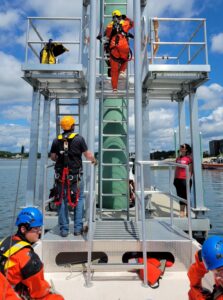 BARNSTABLE – A local environmental advocacy group is seeking action from the Cape Cod Commission to amend its Regional Policy Plan to cut back on carbon emissions.
BARNSTABLE – A local environmental advocacy group is seeking action from the Cape Cod Commission to amend its Regional Policy Plan to cut back on carbon emissions.
350 Cape Cod delivered a petition to the commission this week with proposed amendments to electrify the Cape’s transportation system, and to look into net zero construction across the region.
The Regional Policy Plan is a set of goals, policies, and standards to guide planning and development on Cape Cod and is updated every five years. The new RPP update was approved in January.
“What we are interested in seeing is as the Cape Cod Commission works to manage and plan for future growth and development that it takes state law and global goals into account and really focuses on ways to cut greenhouse gas emissions across Cape Cod,” said Chris Powicki, a 350 Cape Cod member.
Powicki said the RPP update did identify climate change as an existential threat and steps up efforts to build coastal resiliency from sea level rise.
“What the RPP does not do is go far enough in pushing for things that will help us reduce our greenhouse gas emissions,” Powicki said.
The proposed amendments include a push for electrification to the transportation system by developing a network of charging stations to promote electric buses for the Cape Cod Regional Transit Authority and municipalities.
The proposed amendments also set goals for net zero residential construction.
“It may cost a little bit more money up front, but over time this sort of construction will reduce our emissions and improve our environment, and they also will help to revitalize our economy,” Powicki said.
Under a provision of county policy, citizens have the opportunity each year to proposed amendments to the RPP.
“I think this is the first time that this provision of county policy has ever been followed and that we handed in over 300 signatures to the Cape Cod Commission on April 1,” Powicki said.
Once signatures are validated, the Commission is required to respond by holding a public hearing, gather public input and preparing a report. The Commission then must vote to approve, approve with changes, or deny the proposed amendments. An amended RPP would also need to be approved by the Assembly of Delegates.
Even amendments that are shot down by the Commission must be considered by the Assembly.
“What we are hoping to see is a robust dialogue with the Cape Cod Commission, throughout county government and across the region about how are we, as Cape Cod as a whole, going to get our arms around this challenge and how are we going to come up with a plan and actions to cut our carbon footprint,” Powicki said.
Powicki said the Commission has led when it comes to addressing the region’s wastewater challenges and that it can do the same when it comes to climate change.
By BRIAN MERCHANT, CapeCod.com NewsCenter






















